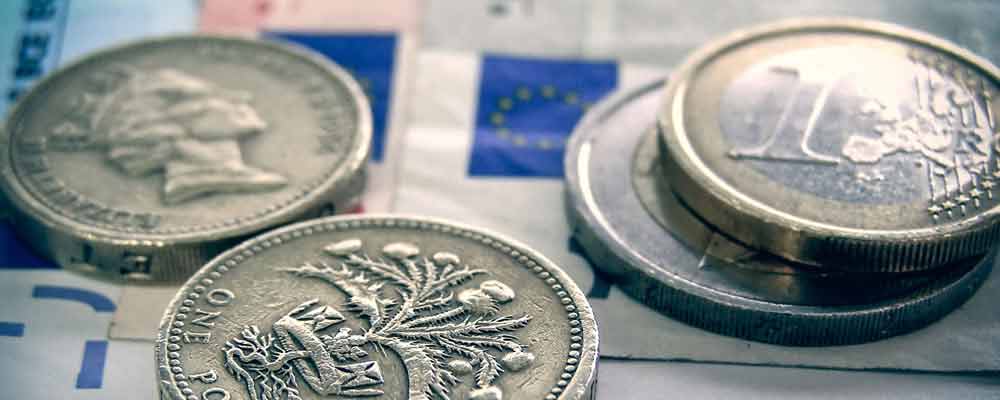GBP/EUR Exchange Rate Steady, UK Recession Fears Hold Back Pound
The Pound Euro (GBP/EUR) exchange rate held steady today after UK Prime Minister Boris Johnson ordered a nationwide lockdown and a ban on gatherings of more than two people to curb the spread of the coronavirus. The pairing is currently trading around €1.07.
With more downward pressure on the UK economy, analysts are now predicting a recession similar –if not worse – than what was seen in 2008.
Today saw the release of the flash UK Markit Services PMI for March. The report fell deep into contraction territory from 53.2 to 35.7.
Blimey. Britain’s services sector, the engine of the UK economy, contracted more than ever in March.
Purchasing Manager’s Index down from 53.2 points to 35.7. Anything below 50 points is a contraction.
Worst since the data series began in 1998 pic.twitter.com/tRcuTcOALm— Ed Conway (@EdConwaySky) March 24, 2020
Duncan Brock, the Group Director at CIPS, commented:
‘The services sector received the largest blow as citizens reduced their social activity and leisure activities were abandoned. The sector recorded its worst drop in activity since 1996 when the survey began. New orders also took a significant hit as the rapid realisation of the significance of COVID-19 applied an abrupt brake on consumer-facing businesses.’
With the outlook looking increasingly grim for both the UK and global economy, we expect the GBP/EUR exchange rate to come under further pressure this week as Downing Street continues to ramp up its measures to prevent the spread of Covid-19.
Euro (EUR) Rangebound as Eurozone PMIs Point to ‘Steep’ German Recession
The Euro (EUR) suffered following today’s release of the flash Germany Markit Composite PMI for March, which fell deeply into contraction territory from 50.7 to a worse-than-expected 37.2.
Phil Smith, the principal economist at IHS Markit, was downbeat in his statement:
‘The unprecedented collapse in the PMI underscores how Germany is headed for recession, and a steep one at that. The March data are indicative of GDP falling at a quarterly rate of around 2%, and the escalation of measures to contain the virus outbreak mean we should be braced for the downturn to further intensify in the second quarter.’
With Germany being the Eurozone’s largest economy, Euro investors are becoming increasingly worried that the bloc could face a larger recession than was previously expected.
Meanwhile, the single currency managed to claim some benefits after the US Federal Reserve announced its open-ended asset purchase program. This was also followed by news that Italy’s coronavirus cases had slowed for their second day in a row.
However, with the growing possibility of a global recession, the EUR/GBP exchange rate is likely to to remain volatile in the coming weeks.
The global economic outlook for 2020 is negative—recession at least as bad as the Global Financial Crisis or worse. But we expect recovery in 2021. How to get there? Read @KGeorgieva's statement here: https://t.co/F1WjFgUwzS #COVID19 #coronavirus pic.twitter.com/M2XgTnTOK0
— IMF (@IMFNews) March 23, 2020
GBP/EUR Forecast: Could Sterling Rise on Further UK Fiscal Stimulus Measures?
Now that the UK is under lockdown, Sterling traders will be paying close attention to the nation’s economic performance going forward. If UK Chancellor Rishi Sunak announces any further stimulus measures to bolster the economy, we could see the Pound begin to rise.
Euro (EUR) investors will be eyeing the German economy. Any indications that the Eurozone’s powerhouse will edge closer to a recession would prove Euro-negative.
However, with the European Union’s strict quarantine measures we could see the single currency begin to suffer as the Euro-area’s borders remain closed to reduce the spread of the coronavirus.



